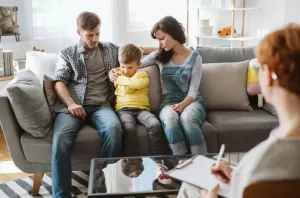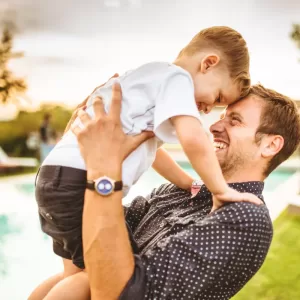The Importance of Reunification Therapy:
Why Guidance Matters

By: Shannon Beaver LCSW, CAADC, Doctoral Candidate, Founder/Therapist at Mount North. | Published: March 18, 2025
Why Reunification Therapy Matters
Real-life strategy to reach your goals.
Family separation or estrangement can be deeply traumatic for both parents and children. Whether due to divorce, family conflict, or parental alienation, the breakdown of a parent-child relationship can cause long-term emotional damage if left unresolved.
Reunification therapy is a structured counseling process that helps estranged parents and children rebuild trust, communication, and emotional connection. However, not all therapists have the skills to handle high-conflict reunification cases. A trained and experienced reunification therapist can guide families through the healing process, while an unqualified or inexperienced counselor may unintentionally worsen conflict and emotional distress.
This article explores the benefits of reunification therapy, the risks of working with an undertrained therapist, the effects of unresolved family estrangement, and how to find the right professional to lead the reunification process.
Real-life strategy to reach your goals.
Who Needs Reunification Therapy?
We strive for diversity across the globe
Reunification therapy is beneficial for families dealing with:
If a child avoids, resents, or refuses contact with one parent—especially due to external influence or conflict—reunification therapy can help repair the relationship in a structured, child-centered way.

Real-life strategy to reach your goals.
How Reunification Therapy Rebuilds Parent-Child Relationships
Real-life strategy to reach your goals.
Reunification counseling helps parents and children reconnect by addressing the root causes of estrangement, alienation, and emotional wounds. A trained reunification therapist provides critical support by:
- 1
Restoring Communication & Trust
Estranged parents and children often struggle to communicate effectively. Feelings of anger, betrayal, or sadness can make engagement difficult. A licensed reunification counselor creates a safe, neutral space where both parents and children can rebuild trust and express emotions without fear of judgment. - 2Resolving Underlying Issues
Reunification therapy uncovers the real reasons behind parent-child estrangement, including:
🔹 Parental alienation
🔹 Unresolved trauma
🔹 Past misunderstandings
🔹 Conflict between parents affecting the childA trained therapist helps families identify these issues, process emotions, and move forward with mutual understanding and respect.
- 3
Supporting Emotional Healing
Estrangement can lead to anxiety, depression, and low self-esteem in both children and parents. A reunification therapist guides families through emotional healing techniques, helping them process grief, anger, and loss in a healthy way. The ultimate goal is healing parent-child relationships, ensuring that both parents and children feel supported, validated, and ready to rebuild trust. - 4
Creating a Step-by-Step Reunification Plan
Healing does not happen overnight. A skilled reunification therapist creates a structured plan that may include:
🔹 Written communication before in-person meetings
🔹 Guided parent-child interactions in a safe space
🔹 Gradual increase in contact at the child’s comfort level
🔹 Conflict resolution strategies to prevent setbacksBy breaking the reunification process into manageable steps, parents and children can rebuild their relationship at a comfortable pace.
- 5
Online Reunification Therapy for Accessibility
For families separated by distance, online reunification therapy provides a flexible alternative to in-person sessions. Virtual counseling ensures geographical barriers do not prevent healing.
Real-life strategy to reach your goals.
We strive for diversity across the globe
How to Find the Best Reunification Therapist for Your Family
Not all therapists have the expertise to navigate high-conflict family estrangement. Here’s how to choose a qualified reunification counselor:

We strive for diversity across the globe
We strive for diversity across the globe
We strive for diversity across the globe
The Dangers of Choosing an Unqualified Reunification Therapist
While reunification therapy is an invaluable tool for healing parent-child relationships, working with an untrained or inexperienced counselor can cause more harm than good.
We strive for diversity across the globe
The Psychological Impact of Parent-Child Estrangement
Real-life strategy to reach your goals.
Unresolved estrangement negatively affects both children and parents:
For Children:
- Increased risk of anxiety, depression, and social difficulties
- Struggles with trust and attachment in future relationships
- Emotional confusion and guilt when caught between parents
For Parents:
- Emotional pain, guilt, and helplessness
- Strained relationships with family and friends
- Financial & legal stress from ongoing custody disputes
Seeking professional reunification counseling can mitigate these negative effects and help families heal.
We strive for diversity across the globe
Overcoming Resistance to Reunification Therapy
If a child or co-parent resists therapy, an experienced reunification counselor will:
We strive for diversity across the globe
Frequently Asked Questions About Reunification Therapy
Real-life strategy to reach your goals.
Q: What is reunification therapy, and how does it work?
A: Reunification therapy is a structured counseling process designed to help estranged parents and children rebuild their relationship. A trained therapist facilitates communication, addresses emotional wounds, and creates a step-by-step plan for reconnection. The process is child-centered, ensuring that the child feels safe and supported throughout therapy.
Q: How long does reunification therapy take?
A: The length of reunification therapy varies depending on the severity of estrangement, the willingness of both parties, and the underlying issues. Some families see progress in a few months, while others require longer-term therapy to fully rebuild trust and connection. A skilled therapist will develop a customized timeline based on the family’s unique needs.
Q: What if my child refuses to participate in reunification therapy?
A: If a child resists therapy, a trained reunification therapist will use age-appropriate techniques to gradually build trust. Strategies may include private sessions, guided communication, and structured activities to help the child feel more comfortable. The goal is to create a safe space where the child feels heard rather than pressured.
Conclusion: Why Professional Reunification Therapy Matters
Reunification therapy with a trained professional offers estranged families a path to healing. By working with a licensed and experienced reunification therapist, parents and children can rebuild trust, improve communication, and restore emotional bonds in a structured, supportive environment.
Choosing the right therapist ensures the reunification process is safe, effective, and child-focused—leading to long-term emotional well-being for both parents and children.
Related Posts


